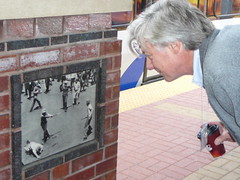Last weekend I was up in Minneapolis for the annual Social Science History Association conference. On Saturday morning I joined about 30 other scholars for a Labor History Tour of Minneapolis guided by Dave Riehle of the Transport Workers Union. The focus was on the 1934 Teamsters Strikes (this photo is of historian Darryl Holter looking at a picture from the strike that is part of an exhibit a light rail station).
We also got a good taste for the rest of the city's history including a few things I didn't know about thanks to historian Peter Rachleff of Macalester College, who is also the incoming president of the Working Class Studies Assoication. In particular I learned that Elliott Park in Minneapolis was an outdoor free speech center much like Bughouse Square. I'll be looking into that in the future.
The 1934 Teamsters General Strike was one of three local struggles during the Great Depression that pushed the federal government to enact collective bargaining legislation. Along with the Autolite strike in Toledo and the West Coast Longshore strike, the Teamsters strike was notable for the participation of unemployed workers, for radical leadership, for highly coordinated strike support activities, and for employer repression in collusion with the local state. These events made Americans think that revolution might be around the corner.
Today it almost seems unbelievable that the cutting edge of revolution was largely in the Midwest, and the Minneapolis tour made clear one reason it is so hard to imagine. The physical landscape of Midwestern cities has been erased by "development." Much more so than in Chicago, the buildings and neighborhoods that housed Minneapolis's labor history are no longer standing. And according to Riehle and Rachleff, you'll have a hard time finding any workers in the new "Mill City Museum," which is build partially inside an old grain mill along the Mississippi River. However, the city's Central Labor Council has sponsored the digitization of the Minnapolis Labor Review from 1907 to the present. And that is no small affair for a labor council!
Global | Local | Middle
Wednesday, November 15, 2006
Subscribe to:
Post Comments (Atom)


1 comment:
This is making me look forward to my trip to Minneapolis next summer for SHARP. And thanks for the link to the Working Class Studies Association. - TL
Post a Comment